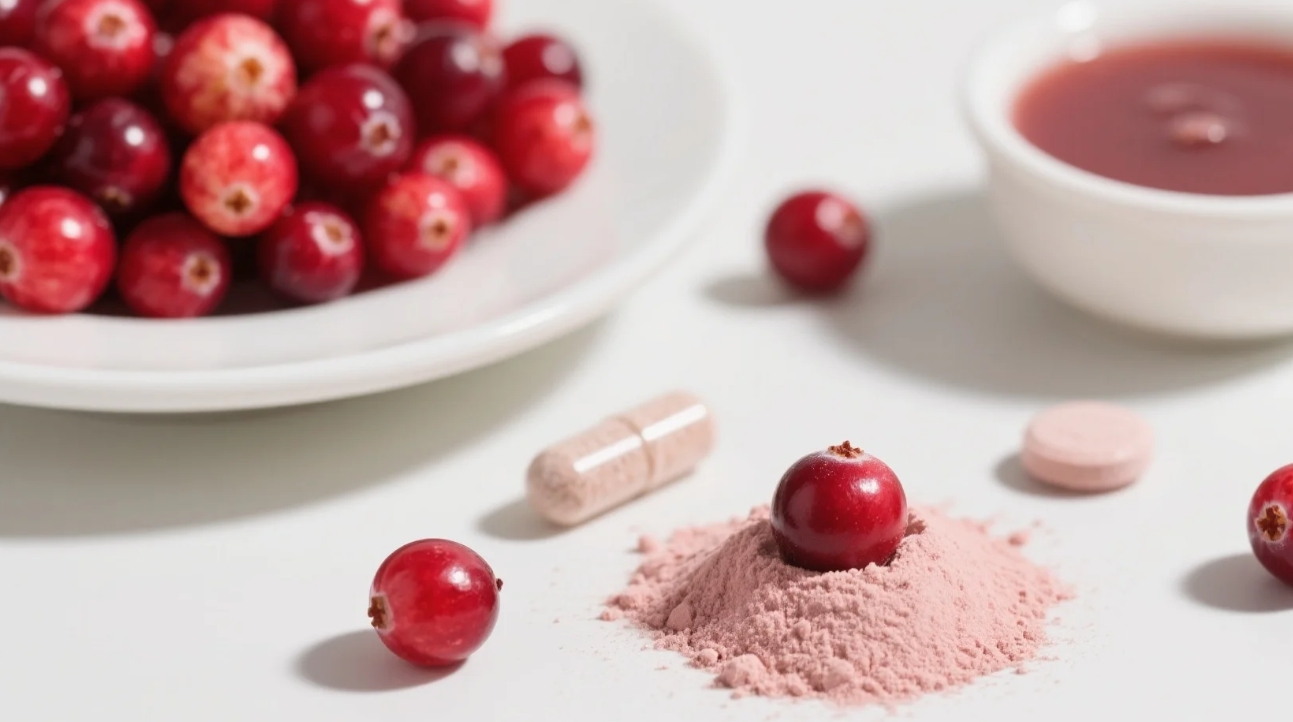Table of Contents
Cranberry’s reputation for urinary tract health is legendary—but its impact on kidneys remains controversial. We cut through the hype to reveal when organic cranberry powder or juice powder supports renal wellness… and when it’s risky.
The Kidney Paradox: Protection vs. Peril
| Benefit | Risk |
|---|---|
| Prevents E. coli adhesion → lowers UTI recurrence | High oxalate content → kidney stone formation |
| Reduces ureteral inflammation | May elevate urinary calcium levels |
| Antioxidants guard nephrons | Acidifies urine → strains damaged kidneys |
Source: JAMA Study on UTIs vs. National Kidney Foundation oxalate warnings
Organic Powder vs. Juice Powder: Kidney Stress Factors
| Factor | Organic Cranberry Powder | Organic Juice Powder |
|---|---|---|
| Oxalate Concentration | 6-8mg/g | 15-20mg/g (3x concentrated) |
| Acidity (pH Impact) | Mild acidification | Aggressive pH drop → pH 2.9 |
| Safe Daily Limit | ≤3g/day | ≤1.5g/day |
| Kidney-Friendly Use | Mix with almond milk (calcium blocks oxalate) | Avoid in oxalate-sensitive individuals |
Critical Insight: Juice powder delivers 4x more proanthocyanidins (PACs)—the compounds preventing UTIs—but concentrates oxalic acid. Organic versions reduce pesticide load but don’t alter natural oxalate levels.
Red-Flag Groups: Who Should Avoid?
Existing Kidney Stones (Especially Calcium Oxalate Type)
- Cranberries rank #3 for dietary oxalates → may enlarge stones
- Alternative: Try organic D-mannose powder (UTI prevention without oxalates)Chronic Kidney Disease (CKD Stages 3-5)
- Impaired oxalate filtration → systemic accumulation
- Solution: Use low-oxalate cranberry extracts standardized to <1mg PAC/mgOn Sodium-Restricted Diets
- Some powders add sodium citrate → spikes blood pressure
- Seek: “Unsweetened + no-sodium-added” labels
When It’s Safe & Beneficial
For Recurrent UTIs (Healthy Kidneys)
- Dose: 500mg juice powder daily → prevents bacterial adhesion
- Evidence: 35% fewer UTIs in women (AJKD 2022)
Post-Antibiotic Kidney Support
- Mix 1 tsp powder in kefir → antioxidants counter drug-induced oxidative stress
Diabetic Nephropathy Prevention
- Anthocyanins improve glomerular filtration rate (GFR) → study shows 31% less albuminuria
Usage Rules for Kidney Safety
- Timing Matters: Take supplements with meals → calcium binds oxalates
- Hydration Non-Negotiable: Drink 8oz water per gram → flushes oxalate crystals
- Alkalize Strategically: Add ½ tsp baking soda to cranberry powder drinks → neutralizes acid
- Lab Test First: Check 24-hour urine oxalate before long-term use
Organic Certification: Why It Matters for Kidneys
| Conventional Risk | Organic Advantage |
|---|---|
| Fungicide residues (e.g., boscalid) → nephrotoxic | ND pesticides |
| Added sulfites → kidney inflammation | No preservatives |
| GMO contamination concerns | Non-GMO enzymatic extraction |
4 Safer Alternatives for Sensitive Groups
| Condition | Recommendation | Mechanism |
|---|---|---|
| Kidney Stones | Chanca piedra tea | Dissolves calcium oxalate crystals |
| CKD | Nettle leaf powder | Lowers creatinine + diuretic |
| UTI Prevention | D-mannose powder | Flushes bacteria sans acidity |
| General Support | Organic blueberry powder | Low oxalate + high anthocyanins |
Medication Alert: Cranberry interacts with warfarin (blood thinners) → risk of bleeding. Avoid if taking cyclosporine, lithium, or nephrotoxic drugs.
The Verdict
Organic cranberry supplements can be kidney-friendly—if you’re stone-free, hydrated, and under dosage limits. Choose powder for lower oxalate needs; juice powder for targeted UTI defense. Always prioritize:
- Third-party oxalate testing (<10mg/serving)
- Avoid during active UTI (acidification worsens burning)
- Pair with calcium-rich foods
Sources: National Institutes of Health (OX-CAM trial), Clinical Journal of the American Society of Nephrology
Consult your nephrologist before use if you have a history of stones, CKD, or take renal-metabolized drugs.
Related Products
Organic Cranberry Powder
Our Organic Cranberry Powder delivers the full spectrum of the berry's natural…
